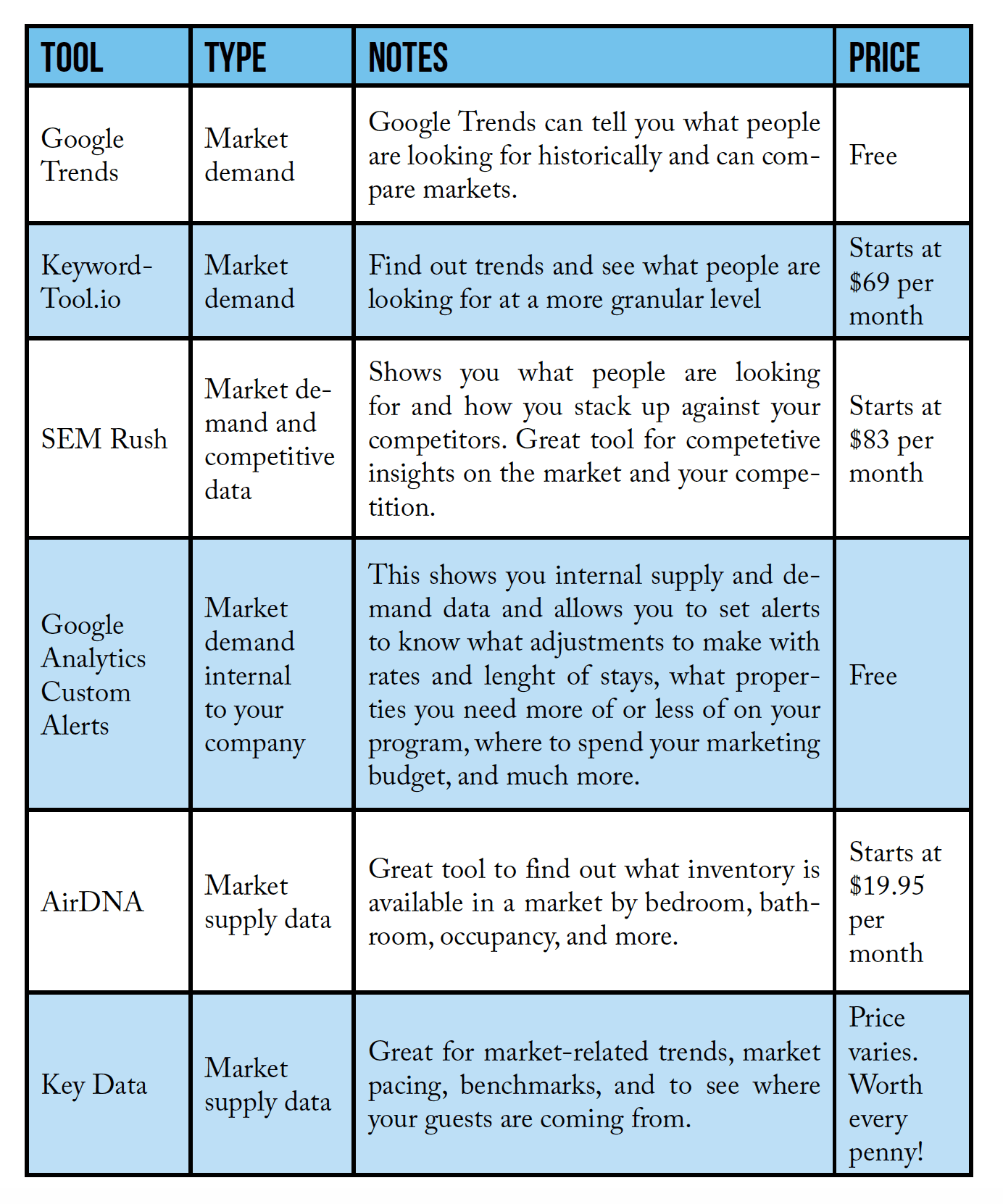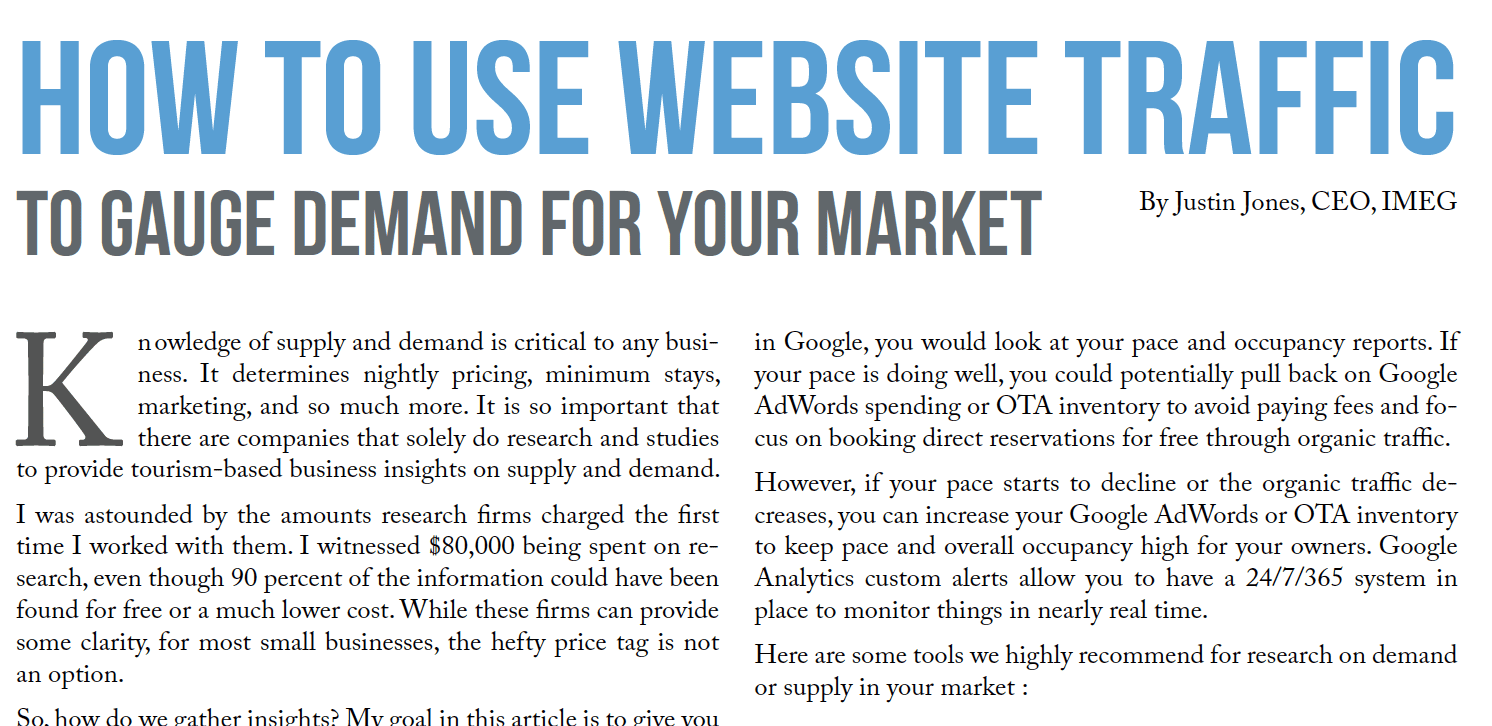Knowledge of supply and demand is critical to any business. It determines nightly pricing, minimum stays, marketing, and so much more. It is so important that there are companies that solely do research and studies to provide tourism-based business insights on supply and demand.
I was astounded by the amounts research firms charged the first time I worked with them. I witnessed $80,000 being spent on research, even though 90 percent of the information could have been found for free or a much lower cost. While these firms can provide some clarity, for most small businesses, the hefty price tag is not an option.
So, how do we gather insights? My goal in this article is to give you some advice on how to use the data you already have, or data that is easy to access, to gauge demand in your market.
Search Volume
How do you find out how many people are looking for vacation rentals?
For an example, let’s use Destin, FL. To see historical data for who is looking for “Destin FL vacation rentals,” you can use Google Trends, a free tool that shows the search volume over time in specific cities and states. You can even compare various destinations to see how this search phrase’s volume is growing or declining compared to that of others. Although you can think through similar terms or searches to narrow your results, such as “2 bedroom Destin, FL vacation rentals,” “Condos Destin, FL,” and so on, in Google Trends, I recommend using KeywordTool.io instead. It lets you search for a topic and quickly find related searches as well as see the demand for those searches as well. Overall, there is much less effort involved.
The KeywordTool.io tool allows you to see related searches that are trending up and down. Therefore, you would be able to see, for example, that the search volume for “7 bedroom vacation rentals in Destin” was trending up, while that for “2 bedroom condo rentals in Destin” was trending down. This will help you think a little differently about your rates or specials.
Custom Alerts in Google Analytics
Now, let’s talk about the people who are almost ready to make a decision to book. Assuming you use Google Analytics to monitor your website’s performance, you can set up custom alerts in Google Analytics by bedroom level and other highly searched pages on the website.
For example, let’s say we have a page that shows all the two-bedroom vacation rentals on our website. Set an alert in Google Analytics to let you know if traffic to that page is up or down >10 percent so you can make adjustments to capture that traffic as bookings if traffic is up or make adjustments to improve traffic if traffic is down.
This is huge if you are spending money on OTAs or Google Ads. For example, if you are seeing a huge organic traffic spike in Google, you would look at your pace and occupancy reports. If your pace is doing well, you could potentially pull back on Google AdWords spending or OTA inventory to avoid paying fees and focus on booking direct reservations for free through organic traffic.
However, if your pace starts to decline or the organic traffic decreases, you can increase your Google AdWords or OTA inventory to keep pace and overall occupancy high for your owners. Google Analytics custom alerts allow you to have a 24/7/365 system in place to monitor things in nearly real-time.
Here are some tools we highly recommend for research on demand or supply in your market:

I hope this article helps to get you thinking about ways to improve your direct bookings. The power of the vast amount of data you already have could be incredible for your bottom line.
If you have any questions, you can always email me directly at justin@imegonline.com. I would be happy to answer any questions you have. I offer a free 30-minute call to all VRM Intel readers where I make myself available to help you with any problem you may have in your vacation rental business. I love to solve problems! I know I can point you in the right direction, but if you feel that you would like a team of experts to consistently implement strategies and more, we would be excited for the opportunity to work with you.


